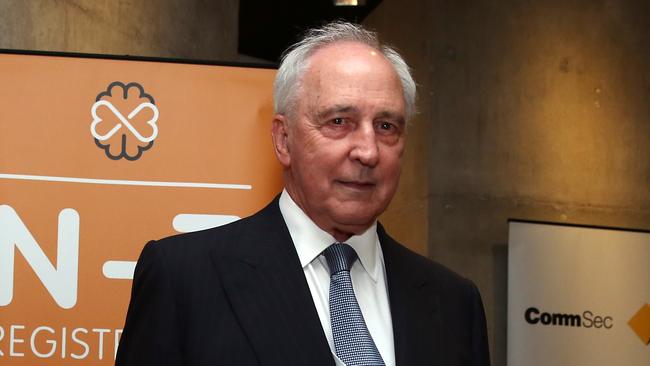China ‘hellbent on $18tn economy, Paul Keating warns
Paul Keating slams Turnbull government foreign policy as “barren” other than to fall in line with that of the US.

Former Prime Minister Paul Keating has slammed the Turnbull Government’s foreign policy as “barren” with no new ideas except to fall in line with US policy, while China was well on the way to becoming the world’s largest economy.
Speaking at the second annual Sohn Hearts and Minds Conference at the Sydney Opera House conference at the Opera House today, Mr Keating slammed the Turnbull Government’s recent moves to join in with the US, Japan and India to try to “contain China”.
“Give me a break,” he said of that idea.
He warned that China is hellbent on growing its economy to $US18 trillion by 2021, putting it on a par with the US in time for the anniversary of the foundation of the Communist Party.
The China Development Bank chairman told saidthat once that target was reached the party was likely to dial back growth, but continue to pull away from the US and be twice its size by the 2030s.
“They are going to head the US off at the pass at $18 trillion. That is what they are going to do.”
Once this was achieved, he said, the Chinese authorities would then slow down their aggressive growth policies but their economic would still continue to outstrip the US economy in size and growth.
He said the US big strategic bet of transferring capital and technology to China in hope of creating a liberal democracy was likely to fail in the long term, posing challenges for the established order of globalism.
“The US has transferred its technology, a lot of its capital, in the hope of turning up a liberal democracy in China. And the chances are that it won’t happen.
“The big policy punt has been a big failure for them. They have got nothing in return.”
Mr Keating said the Turnbull Government had been “freaked out by the security agencies” into adopting a very pro-US foreign policy in Asia.
But he said a newly powerful China was not going to be part of the US view that it would remain a trading country while the US was the superior naval power in the Pacific.
Mr Keating said he strongly disagreed with President Obama’s pivot back to Asia, in 2008 which was about the US maintaining a “strategic hegemony” in Asia.
He said this involved the assumption that the Chinese state with an economy which was almost as large as that of the US, “would be prepared to be superintended by the US Navy and that China would be happy to outsource its security to the US Seventh fleet.”
He said China’s president Xi Jinping had taken a decision to reassert the Communist Party’s control of the economy in a bid to crack down on corruption in the country and deliver continued economic growth.
He said Mr Xi was determined to take China out of its “middle income trap” by continued economic growth as well as investing in the industries of the future.
He said the Turnbull Government had “no policy” to deal with the rising power of China.
“The foreign policy of Australia is the foreign policy of the US,” he said.
“And the US has no policy on China as it hasn’t been able to conceive of one.”
“So we are wandering around on an island continent with all of nature’s goodies being able to lock into the fastest and biggest economy in the world,” he said.
But instead of engaging with China, he said Foreign Minister Julia Bishop was talking about a “quadrilateral” agreement between Australia, the US, India and Japan.
It said this was aimed at “making a containment policy around China.”
“Give us a break.”
“This is the barrenness of foreign policy in Australia.”
He said China was committed to globalisation but it was saying “no to the Washington consensus” which basically saw US domination of the Asia-Pacific region.
He said the world was set for a major “bifurcation” where there would be the Atlantic world which had about two per cent economic growth rate and a separate region taking in China and India which had much larger economic growth rates.
He said Mr Xi had had to make some “tough decisions” on how to lead China which involved tighter party controls.
“But one thing you can be sure of, China is going to be number one,” he said.




To join the conversation, please log in. Don't have an account? Register
Join the conversation, you are commenting as Logout